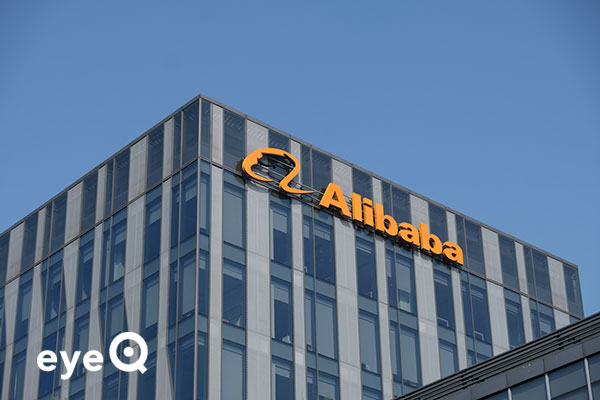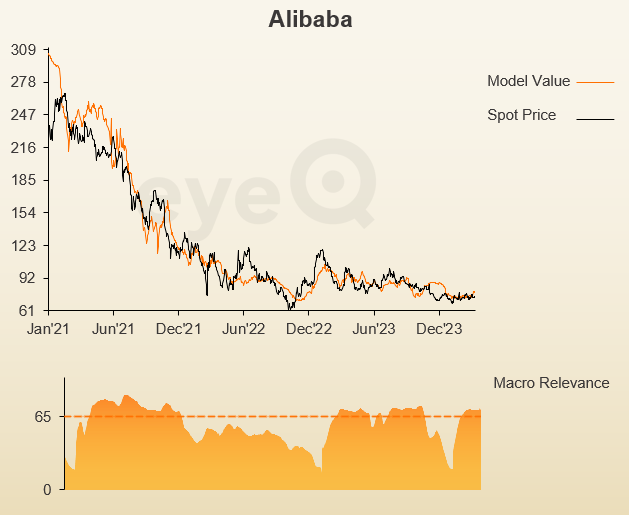eyeQ: Alibaba – the Chinese mega-cap in value territory
interactive investor has teamed up with the experts at eyeQ who use artificial intelligence and their own smart machine to analyse macro conditions and generate actionable trading signals. It says this famous stock is cheap.
27th March 2024 10:29
by Amit Khanna from eyeQ

"Our signals are crafted through macro-valuation, trend analysis, and meticulous back-testing. This combination ensures a comprehensive evaluation of an asset's value, market conditions, and historical performance." eyeQ
- Discover: eyeQ analysis explained | eyeQ: our smart machine in action | Glossary
Alibaba
Trading signal: strategic long-term
Model value:$78.95
Fair Value Gap: -10.4% discount to model value
Model relevance: 69%
Data correct as at 27 March 2024. Please click glossary for explanation of terms.
Alibaba Group Holding Ltd ADR (NYSE:BABA) is China’s largest e-commerce platform, with multiple business units across online retail, cloud computing and media entertainment. The stock is trading close to all-time lows, pummelled as regulatory headwinds, geopolitical and recession risks have risen over the last three years. Alibaba has lost almost 80% of its market cap since peaking in October 2020.
This has left Alibaba trading at about 8 times forecast earnings over the next 12 months, which compares to 21 times for the S&P 500. The stock sits on a massive cash balance representing about 40% of its market capitalisation. In other words, it is now in value territory. This reflects slowing top-line growth and those regulatory risks, with 8% revenue growth forecast for next year versus more than 30% a couple of years ago.
In recognition of this new reality, the company declared its first dividend in November and recently substantially increased its share buyback programme over the coming years. In early March, the Chinese authorities also held a joint press conference on 2024 economic policies. Policymakers reiterated their supportive stance, stating that there will still be room to cut interest rates and expand domestic structural policy tools geared at consumption. The stock has been broadly flat since that conference.
The eyeQ smart machine is highlighting that at current price levels, macro risks at least seem to be well priced in. The stock today is trading at a 10% discount to its eyeQ model value. The macro backdrop is an important driver for a Chinese mega-cap bellwether such as Alibaba. Macro forces can explain 70% of Alibaba price action over the last 12 months.
Commodities and inflation expectations are key drivers. Copper has risen almost 10% from its February lows, and crude oil about 15%. This has driven the eyeQ model value of Alibaba higher, in contrast to the stock edging lower this month. A backdrop where inflation remains stickier than expected in developed markets would also be beneficial for the stock.
Therefore, eyeQ believes this may well offer an attractive entry point for those willing to wait and diversify their portfolio outside developed market equities.

Source: eyeQ. Past performance is not a guide to future performance.
Useful terminology:
Model value
Where our smart machine calculates that any stock market index, singe stock or exchange-traded fund (ETF) should be priced (the fair value) given the overall macroeconomic environment.
Model (macro) relevance
How confident we are in the model value. The higher the number the better! Above 65% means the macro environment is critical, so any valuation signals carry strong weight. Below 65%, we deem that something other than macro is driving the price.
Fair Value Gap (FVG)
The difference between our model value (fair value) and where the price currently is. A positive Fair Value Gap means the security is above the model value, which we refer to as “rich”. A negative FVG means that it's cheap. The bigger the FVG, the bigger the dislocation and therefore a better entry level for trades.
Long Term model
This model looks at share prices over the last 12 months, captures the company’s relationship with growth, inflation, currency shifts, central bank policy etc and calculates our key results - model value, model relevance, Fair Value Gap.
These third-party research articles are provided by eyeQ (Quant Insight). interactive investor does not make any representation as to the completeness, accuracy or timeliness of the information provided, nor do we accept any liability for any losses, costs, liabilities or expenses that may arise directly or indirectly from your use of, or reliance on, the information (except where we have acted negligently, fraudulently or in wilful default in relation to the production or distribution of the information).
The value of your investments may go down as well as up. You may not get back all the money that you invest.
Equity research is provided for information purposes only. Neither eyeQ (Quant Insight) nor interactive investor have considered your personal circumstances, and the information provided should not be considered a personal recommendation. If you are in any doubt as to the action you should take, please consult an authorised financial adviser.
Disclosure
We use a combination of fundamental and technical analysis in forming our view as to the valuation and prospects of an investment. Where relevant we have set out those particular matters we think are important in the above article, but further detail can be found here.
Please note that our article on this investment should not be considered to be a regular publication.
Details of all recommendations issued by ii during the previous 12-month period can be found here.
ii adheres to a strict code of conduct. Contributors may hold shares or have other interests in companies included in these portfolios, which could create a conflict of interests. Contributors intending to write about any financial instruments in which they have an interest are required to disclose such interest to ii and in the article itself. ii will at all times consider whether such interest impairs the objectivity of the recommendation.
In addition, individuals involved in the production of investment articles are subject to a personal account dealing restriction, which prevents them from placing a transaction in the specified instrument(s) for a period before and for five working days after such publication. This is to avoid personal interests conflicting with the interests of the recipients of those investment articles.